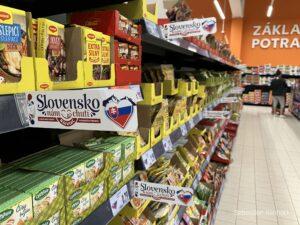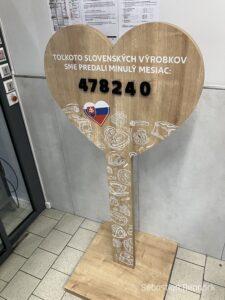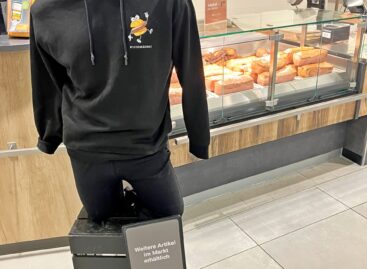Kaufland Slovakia emphasizes local ranges
Kaufland shows its support for domestic Slovak producers. Industry reports show a general decrease in the share of national products on the shelves of large retail chains. Legislators repeatedly discuss mandatory quotas for nationally produced food.

Locally produced products are displayed prominently on the shelf
Kaufland in Slovakia emphasizes its cooperation with domestic producers. As Richard Bendík, Purchasing and Marketing Director of Kaufland Slovenská republika, says in a company statement, cooperation with Slovak suppliers plays a key role in the company’s business strategy.
Kaufland backs up this statement with the results of a recent GfK YouGov study, according to which the supermarket operator has the highest exposure to Slovak products among all retail chains in the country for the eighth year in a row. Contrary to the general industry trend, Kaufland points out that it has increased the share of domestic products on its shelves by two percentage points. The survey was conducted nationwide in 360 stores of different retail chains in 32 categories in July 2024.
Kaufland also emphasizes local products in its customer communication. Under the motto “Local products firsthand – from the producer to the table”, the current weekly flyer includes a double page for the regionally sourced assortment. Already in 2018, the retailer launched a national private label under the brand ‘Z lásky k tradícii’ (For the love of tradition), which currently includes more than 60 products, according to the retailer’s website.
Supporting domestic producers is a key political issue in Slovakia. A market study by the Slovak Food Chamber (PKS), also conducted this summer, comes to different conclusions: According to Go4insight’s findings, the national average share of Slovak food on the shelves in 2024 fell by 0.6 percentage points to 41.2% compared to 2023, a decline for the second year in a row. According to the industry association, domestic retailers were the leaders when it came to Slovak products, with Coop Slovensko having a 55% share, supermarket operator Fresh a 51% and CBA a 46% share. International retail chains Kaufland and Tesco followed with 42%, supermarket operator Billa and discounter Lidl with 41% and 29%, respectively.

How many Slovakian products we sold last month’ – a sign at the entrance of a Kaufland store
Policymakers have repeatedly sought ways to influence foreign retail chains to stock more Slovak products. In spring this year, Slovak Minister of Agriculture Richard Takáč announced plans to require retailers to stock a defined minimum proportion of Slovak food products on their shelves.
Attempts to impose quotas on domestic food producers are not new in Central Europe. The Czech parliament passed an amendment to the Food Act in 2021, which requires food retailers with a sales area of more than 400 square meters to stock at least 55% of domestic brands on their shelves. Between 2017 and 2020, larger food retailers in Romania were required to offer at least 51% of fresh produce from national, regional or local suppliers. Both cases were abandoned by the respective national legislators due to the intervention of the European Commission.
Related news
Related news
MOHU: 5,200 return points are in operation, but 47 larger settlements still do not have RE points – public “enema” machines may be introduced
🎧 Hallgasd a cikket: Lejátszás Szünet Folytatás Leállítás Nyelv: Auto…
Read more >Change in Rossmann Hungary’s leadership: Kornél Németh decided to move towards new challenges in 2026
🎧 Hallgasd a cikket: Lejátszás Szünet Folytatás Leállítás Nyelv: Auto…
Read more >








